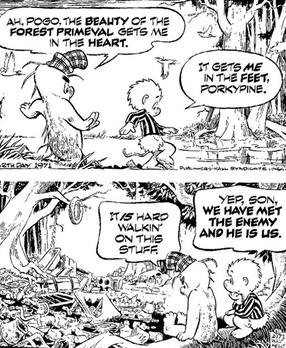I've heard a lot of chatter recently about how we (public servants) can't work in a more openly because of the "risks" of putting our information "out there". I've always tried to push back on people who hide behind the risk argument because, quite frankly, I feel as though their fears are vacuous, unfounded, and have yet to run into someone who can substantiate them with a real world example.
At the risk of being pedantic, "risk" is often the public service equivalent of the boogie man, a ghost story we tell youth to scare them into compliance with the established norms of behaviour.
There are core assumptions that underpin this fear
However, when we examine them logically we quickly find that they are all categorically false. To be clear, when I speak of "openness" I'm not referring to out there in the wild writ large but within our borders - not the borders of your cubicle, directorate or department, but rather that of the enterprise as a whole - the municipal (local), provincial (state), or federal governments within which we work. This isn't the first time I try to tackle this particular issue on this blog, but given some the discussions I've had recently, the subject merits a redux.
But first I wanted to set up the discussion by arguing that GCPEDIA (the Government of Canada's official internal wiki) has the potential to be the single most transformative technology adopted by the Government of Canada since the first computers were issued to civil servants twenty years ago. It is the only technological environment (possibly with the exception of the lesser known GCConnex and GCForums) that allows public servants to share information across the entire enterprise. It has the potential to level geography, silos, and hierarchy and in so doing allows the civil service to tap into its
cognitive surplus like no other technology to date has.
Yet, much of this potential goes unrealized
While there is likely a wide range of reasons why this is the case, I want to focus narrowly on the issue of the perceived risk of using GCPEDIA. For the remainder of the discussion, when I refer to "working more openly" what I am really saying is "working inside the Government of Canada's Open Wiki Platform known as GCPEDIA". That said, below are the false assumptions that keep civil servants from working more openly; I will go through each one after listing them:
- People are interested in your work
- People will search for your work
- People will read your work
- People will comment / edit / interact with your work
- The comments / edits / interactions of others will decrease the overall quality of your work
#1: People are interested in your work
The first assumption is that other people are actually interested in the work you do, putting it in the open will obviously attract immediate and widespread attention from your public servant peers. However, the truth is that while you may think your work is of the utmost importance the simple fact is that majority of other people in your organization simply don't care. They have diverging responsibilities and areas of interest; yes, there will be overlaps but not anywhere near the frequency or intensity that the fearful would have you believe. In Canada, the federal Government employs over 250,000 public servants and the breadth of the work is as wide as it is deep. This leads me to think that it is far more likely that the
mechanics of our work overlap than it is the
substantive nature of that work. In other words, we may both be policy analysts (convergent tasks) but that which we analyse is radically different (divergent subject matter).
#2: People will search for your work
The second assumption flows naturally from the first, that people are looking for your work. We assume that putting it out there (in the open, on GCPEDIA) means that it will be exposed to everyone when in reality its more akin to hiding in plain sight. Think about open work environments as akin to the web itself. You aren't bombarded with everything on the web when you open your browser. It's more likely that you use an intermediary - like Google - to help you parse through the ridiculous amounts of data on the internet. Think about how much is actually on the web versus how much you have actually seen. The same holds true in open work environments. People use intermediaries - search - to help them parse through the massive amounts of information available to them. Having to search prior to discovering the content you are sharing may not sound like much, but think about the things you search for on a regular basis and then compare that to volume of things you don't search for. This is a akin to needle in a field of haystacks. Moreover, the act of searching should be considered as
proof of interest. By this I mean the people who search for your work and find it, are likely to have a genuine interest in it.
#3: People will read your work
The third assumption - that your work is actually read-worthy - is another big leap. What percentage of things you search on the web do you actually spend time reading? If you are like me its probably a small fraction. I search, scan, move on, scan, move on, scan, pinpoint, deep dive, move on, scan, etc. There is simply too much information out there to engage with it all in a meaningful way.
#4: People will comment / edit / interact with your work
The fourth assumption, that people will interact in some way with your work is a stretch at best; in fact, I presented evidence to the contrary in
a previous blog post. Think about your own usage of web based environments. Do you comment, edit, or share every article you read online or are you more meticulous in your interactions? Its more likely that you don't have the interest, time or expertise to interact with all of the content flashing across the screen.
#5: The comments / edits / interactions of others will decrease the overall quality of your work
I think that the final assumption - that the contributions / interactions of others will water down your work - is fairly presumptuous and smacks of a touch of ego. The prevailing thought process here seems to be (and pardon my plain language) that if I expose my work to others they are going to screw it up in some way. I think this line of reasoning also signals a complete lack of trust in your fellow civil servants.
Why would they troll you? The technology (GCPEDIA) provides some built in protections. All contributions are done through attribution and are easily traced back to a Government of Canada email address, you can set up alerts on specific pages so you are notified when changes occur, and the version control is extremely tight. I find it ironic that many people are willing to hand a printed document to a colleague and ask them to provide "a second set of eyes" but far fewer are willing to use a technological medium to offer that same opportunity to far more people.
The redux in sum
The false assumptions that the fear of openness is based on are interest, search, read, interact, and detract. I would like to conclude simply by encouraging you re-articulate the argument above to anyone who regularly pushes against greater openness in the enterprise.
Cheers
Addendum (Update 25/11/2012)
What I didn't mention, but is worth adding is that if someone actually does take the time to go through all of these steps, they likely were interested enough to search, read, and interact with your work. Under these conditions - and the technological restraints of a place like GCPEDIA - it is far more likely that they are adding value to your work, not taking it away. For evidence of this nuance, click
here.
Originally published by Nick Charney at cpsrenewal.ca
subscribe/connect





















